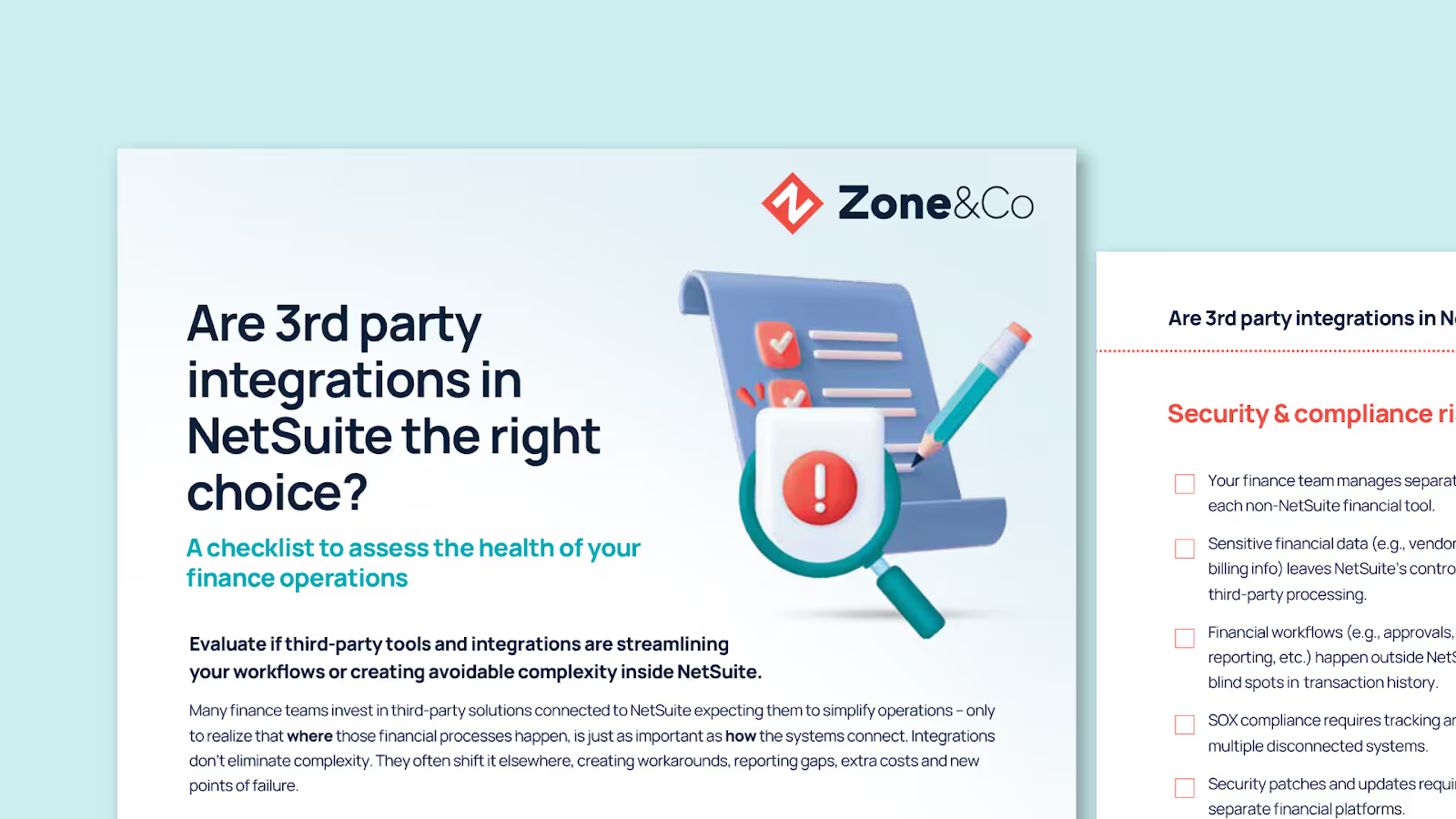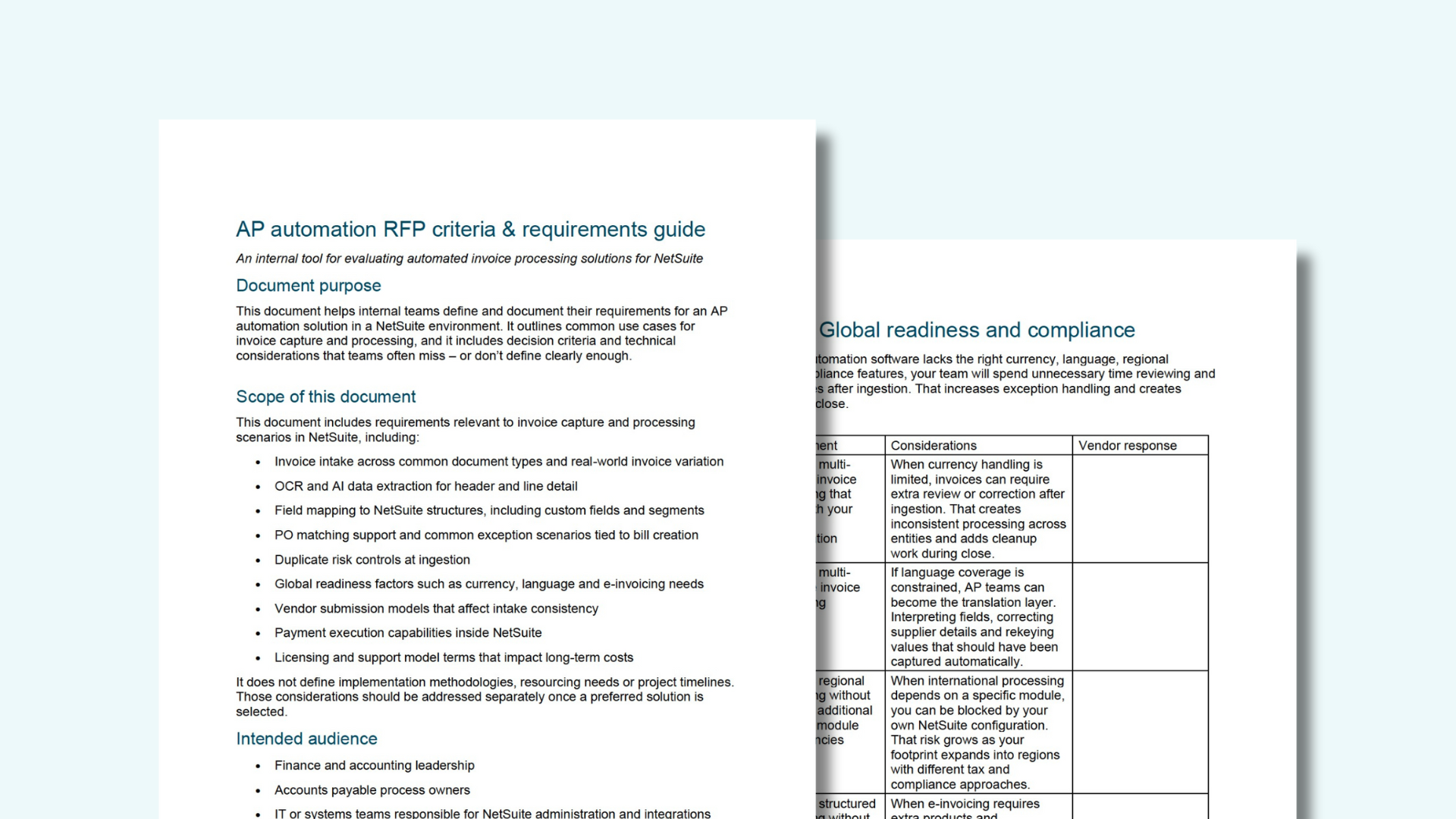NetSuite integrations: Best practices and top tools
.avif)
When finance teams finally get the approval to expand their tech stack, NetSuite integrations can seem like the fastest, smartest way to add new functionality – at least, that’s the pitch bolt-on vendors love to make.
But once scale hits, those same integrations often create more friction than they remove: syncing delays, reconciliation gaps, compliance risk and the ergonomic nightmare of toggling between tabs just to complete a single task.
Zone offers a different approach. Instead of relying on external tools, its SuiteApps bring AR, AP, FP&A, reporting and payroll automation directly inside NetSuite. That means finance teams get the advanced functionality they need without the inefficiencies and risks that come with a patchwork of integration solutions.
Read on to learn why embedding native automation beats integrations every time – and get best practices around implementing our solutions.
Key highlights:
- A single, unified platform enables finance teams work faster, stay audit-ready and support growth without retooling.
- While NetSuite integrations promise to extend functionality, they often introduce syncing delays and duplicate records.
- Instead of relying on external tools, Zone delivers embedded, purpose-built automation that keeps all processes inside NetSuite for speed, accuracy and simplicity.
- Zone’s SuiteApps embed AR, AP, payroll, FP&A and reporting automation directly into NetSuite, eliminating fragile connections.
What is NetSuite integration?
NetSuite integration is the process of connecting NetSuite with other business applications so data can flow between systems without manual entry – theoretically. The best use cases extend NetSuite into processes such as quote-to-cash, procure-to-pay, workforce management, and financial planning. The pitch is that by linking different systems together, businesses can create a more unified view of their operations and reduce repetitive work.
But “seamless” third-party integrations often come with seams. Most bolt-on solution providers are building for many different ERP systems, so for NetSuite users, integrations are usually one-size-fits-all. Syncs fail. Data gets duplicated or delayed. And for finance teams that depend on accuracy and real-time visibility, those risks can outweigh the benefits.
Common NetSuite ERP integration use cases
NetSuite ERP integration is used to connect NetSuite with specialized tools that support different parts of your business. Common use cases include:.
Analytics and reporting integrations
Beefing up analytics and reporting can be a quick win. Businesses often plug in BI platforms and dashboards to make financial data easier to analyze. It’s a good instinct, but when data volumes increase, the cracks appear: multiple logins, inconsistent data refreshes and fragile syncs that break whenever fields or processes change inside NetSuite.
A more sustainable approach is to eliminate the need for external connectors altogether. Instead of a complex NetSuite data integration project that pipes information to outside tools, finance teams can use NetSuite-native solutions that deliver real-time reporting directly within their trusted ERP.
Ecommerce integrations
Ecommerce businesses often integrate their storefronts with NetSuite to centralize order, inventory and financial data. But when those integrations fail – even briefly – the entire chain breaks: costly errors in inventory, delayed shipments, misaligned revenue. What was supposed to be a single source of truth becomes a source of confusion.
While those NetSuite integrators are focused on storefront-to-ERP sync, the finance workflows behind them still require stitching together billing, reconciliation and reporting. With Zone's SuiteApps built natively for NetSuite, finance teams can easily manage cash, close faster and reconcile across payment platforms – without leaving their platform.
CRM and customer data integrations
Friction shows up fast when sales is focused on closing deals – and finance is left cleaning up the terms. NetSuite CRM integrations try to bridge the gap by syncing customer and sales data. But when those systems fall out of sync? That’s when the blowups happen.
Zone’s approach keeps everyone happy and working toward the same goals by keeping customer data sources directly inside of NetSuite. Each time a contract is amended and quoted in Salesforce, ZoneBilling automatically updates the contract for accurate invoicing, revenue recognition and reporting. When sales and finance are working well together, everyone wins – including the customer.

What are the best NetSuite integration tools?
When businesses look for the best integration tools, they usually start with middleware platforms or prebuilt NetSuite connectors. These tools promise to link with NetSuite and deliver new functionality without replacing the ERP. But to make it all work, the integrations provide a bridge ensuring that data sharing happens across all systems.
The bridge is the source of the problem. Every connection point is a potential failure – syncs break, data is duplicated and compliance risks mount as sensitive information flows through external platforms. Finance teams end up spending as much time monitoring and reconciling as they do analyzing results. That’s why many leaders discover that bolt-on integrations, no matter how “seamless” they claim to be, often create new complexities even as they automate operations.
Zone takes a different approach by eliminating the need for integration. Instead of patching in third-party systems, its NetSuite-embedded automation helps teams accelerate cash flow, simplify payables and close the books faster – all inside NetSuite.
What are the main challenges of integrating NetSuite with third-party tools?
Data inconsistency is the biggest challenge of integrating NetSuite with third-party applications and tools. But it’s not the only one. Hidden maintenance costs are a concern. So is the constant oversight that’s required, as most bolt-on providers are integrating with dozens or hundreds of ERPs, so issues can fall through the cracks.
Let’s break down some of the other challenges that make integrations more of a liability than a long-term solution.
Best practices for successful integration with NetSuite
The most successful integration with NetSuite may not be an integration at all. Native solutions, built by SDN-certified partners, often deliver better performance – with fewer delays, fewer sync failures and no middleware to maintain.
Before connecting external systems, it’s worth asking: Could this functionality live natively inside NetSuite? And if so, why not keep it there?
1. Prioritize native NetSuite SuiteApps
Native SuiteApps run directly inside the NetSuite platform – no external databases, no separate logins, no middleware to monitor. Because they inherit NetSuite’s data model, workflows and permissions, finance teams can trust that transactions, reports and approvals are accurate and traceable.
With fewer systems to manage than you'd typically have with NetSuite integrations, there's less overhead, fewer failure points and more time for your team to focus on high-impact finance work. And when audit season hits, everything you need – transactions, approvals, documentation – is already inside NetSuite.
2. Automate early and strategically
The best time to automate is before things break. Native automation allows finance teams to build scalable business processes early – from billing and collections to AP, payroll and close – without introducing the complexity that comes with a third-party NetSuite integration platform.
Because these workflows operate inside NetSuite, automation becomes part of the system of record – not an add-on that needs to be reconciled or monitored separately. And as the business grows, that embedded automation scales right along with it.
3. Streamline approvals for all users
Approvals often slow down finance operations – not because teams are unresponsive, but because the process spans disconnected tools. When approval workflows rely on integration with NetSuite, finance is stuck chasing updates, re-checking records and resolving mismatches between systems.
Native SuiteApps remove that friction. Invoices, payments and journal entries can be routed for approval directly inside the platform – even to non-NetSuite users via email – all while maintaining a clear audit trail.
4. Minimize context switching
The more tools your team juggles, the more likely it is that they’ll miss something. Switching between tabs, systems and interfaces that integrate NetSuite introduces opportunity for error – not to mention frustration.
NetSuite-native SuiteApps keep all your financial workflows within one environment, so teams can work faster and stay focused.
5. Build in scalability from day one
Growth brings more customers, more transactions, more complexity. And if your finance processes aren’t built to handle that volume inside your ERP, you’ll be stuck scaling workarounds – or people. That’s where most NetSuite integration services fall short. They connect systems, but they don’t solve for long-term scalability inside the ERP.
Native SuiteApps give you a foundation that’s built for scale. Whether it’s handling multi-entity billing, reconciling PSP settlements across currencies or managing approvals across departments, the right SuiteApps keep your core finance operations extensible – without adding technical debt.
6. Maintain a single source of truth
Finance can’t operate with fragmented data. When you rely on external tools – or a NetSuite CRM integration that keeps customer contract data in another system – it’s easy to end up with silos, duplicates or delayed updates, especially when those integrations don’t run in real time.
Native automation helps preserve a single source of truth by keeping your financial data – including billing, payments, approvals and revenue recognition – inside the ERP. That means every team is working from the same, up-to-date record.
7. Focus on rapid adoption
The faster your team adopts a new process, the faster you see value. But that’s harder to do when you integrate NetSuite with third-party tools that require separate training, logins and workflows.
NetSuite-native SuiteApps feel familiar from day one. Because they have the same UI, permissions and navigation, finance teams can pick them up quickly and hit the ground running.
8. Work with experienced NetSuite integration partners
Even the best NetSuite integration tools can fall short without thoughtful implementation. And while native SuiteApps reduce the need for complex integrations, experience still matters.
Zone’s SuiteApps are built and supported by long-time NetSuite experts who understand what finance teams need to scale. Implementation is fast, support is accessible and the functionality runs entirely inside your ERP – no API maintenance, no unexpected sync issues, no custom middleware to troubleshoot.
Operate faster, safer and fully inside NetSuite with Zone
Finance leaders aren’t asking for more tools. They’re asking for outcomes.Zone’s SuiteApps deliver automation for all your financial workflows directly inside NetSuite – without the delays, risks or overhead of traditional NetSuite integration. The result? A finance stack that:
- Scales with your business
- Keeps data clean
- Makes audits less painful
Want to see it live? Book a demo for a tailored walkthrough of how Zone’s SuiteApps work natively inside NetSuite – and why that matters when growth hits.
FAQs
- How does NetSuite integration work?
- NetSuite integrations work by connecting the ERP to external systems so data can move between platforms without manual entry, improving efficiency. Most companies set up these integrations to extend functionality. But to get data from your system to the bolt-on solutions and back, it must be passed through connectors and middleware. This can cause sync issues that lead to a whole host of problems.
At a technical level, many of these setups depend on the NetSuite integration API to pull or push data in and out of the system. While this gives developers flexibility, it also creates a weakness – every schema change or update can break those connections.
- NetSuite integrations work by connecting the ERP to external systems so data can move between platforms without manual entry, improving efficiency. Most companies set up these integrations to extend functionality. But to get data from your system to the bolt-on solutions and back, it must be passed through connectors and middleware. This can cause sync issues that lead to a whole host of problems.
- What are the benefits of using NetSuite integrations?
- The benefits of using NetSuite integrations are many. They include the ability to extend NetSuite’s core functionality. By connecting to third-party tools, companies can fill gaps in their ERP environment without a full system overhaul. This can give teams a broader set of capabilities.
The NetSuite integration API allows developers to build custom connections that align with unique business needs. This flexibility can be valuable, allowing connection to internal systems and niche solutions. But always be aware that integrations come with trade-offs in terms of complexity, scalability and long-term maintenance.
- The benefits of using NetSuite integrations are many. They include the ability to extend NetSuite’s core functionality. By connecting to third-party tools, companies can fill gaps in their ERP environment without a full system overhaul. This can give teams a broader set of capabilities.
- How much do NetSuite ERP integrations cost?
- NetSuite ERP integrations aren’t just a line item – they’re an ongoing expense. Setup alone can range from a few thousand dollars for basic connectors to tens of thousands for custom builds. But the bigger cost often shows up later: maintenance, upgrades, sync failures and the downtime your team spends troubleshooting.
Working with NetSuite integration partners may help you get up and running, but their fees add another layer of cost – and the total cost of ownership climbs fast. By contrast, native SuiteApps eliminate the need for ongoing integration management. They run entirely inside NetSuite, which means no middleware to maintain, no APIs to babysit and no hidden support bills.
- NetSuite ERP integrations aren’t just a line item – they’re an ongoing expense. Setup alone can range from a few thousand dollars for basic connectors to tens of thousands for custom builds. But the bigger cost often shows up later: maintenance, upgrades, sync failures and the downtime your team spends troubleshooting.
- What CRM platforms integrate with NetSuite?
- Salesforce, HubSpot and other leading CRM platforms can connect through a NetSuite CRM integration. On paper, these integrations sync sales and customer data into NetSuite so finance can keep pace with bookings. In practice, they often create new challenges, including:
• Mismatched records
• Duplicate data
• Keeping both systems in sync
Native NetSuite solutions like ZoneBilling take a different path. Instead of pushing data back and forth between systems, they update customer and contract data directly inside NetSuite. That means accurate invoicing, compliant revenue recognition and reporting your finance team can trust – without the fragility of external integrations.
- Salesforce, HubSpot and other leading CRM platforms can connect through a NetSuite CRM integration. On paper, these integrations sync sales and customer data into NetSuite so finance can keep pace with bookings. In practice, they often create new challenges, including:
Recommended resources
Get a Personalized Demo Today
Start a conversation with an expert who asks thoughtful questions and shows you how Zone & Co can solve your unique problem.





.jpg)
